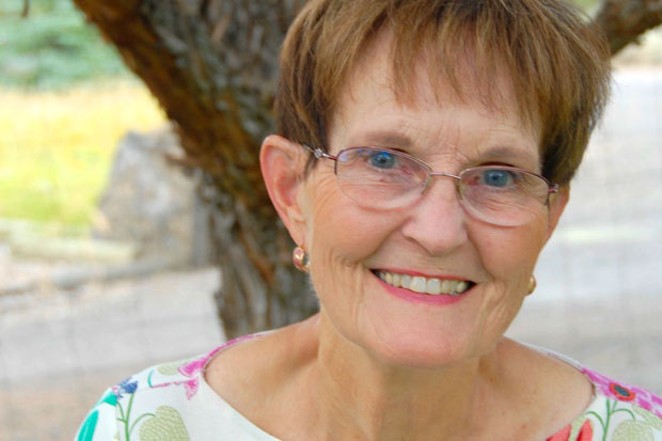"Women's history must be invented... both uncovered and made up." – Virginia Woolf
Envisioning the wild, wild West leads to very specific imagery: dusty trails, tumbleweeds and rugged, leather-clad cowboys patrolling the countryside on horseback. Men certainly take the spotlight when it comes to historical depictions of the Old West. Author and longtime Bendite Jane Kirkpatrick has dedicated her literary career to giving historical women the voice they deserve—even if that means putting words into their mouths.
Kirkpatrick has written a total of 27 novels and five nonfiction books since 1991. Her career began in the classroom. "I took a class at the community college in Bend," explained Kirkpatrick. "My teacher was really encouraging. He told me, 'I think you could sell some of your assignments.' And I did! I wrote a short essay about my husband teaching me how to fish. It was bought by a national magazine." That very same essay opened her eyes to the powerful impact writing has on readers. "I had men reaching out to me, thanking me for what I had written," she explained. "They wanted to share their hobbies with their girlfriends or wives... they showed them the article, and it helped. Now, when I get a bad review, I go back to that article. It reminds me that writing is meant to encourage and inspire people."
Since then, Kirkpatrick has shifted her attention to historical fiction. Why? To esteem strong, important women that may have otherwise been forgotten, she says. "They gracefully went about the challenges they faced. My books focus on their own capacity to be generous and kind and take care of themselves and others."
Kirkpatrick bases her protagonists off of real women, though she quickly found that digging up historical accounts of females was far more difficult than finding facts about their male counterparts. "It's kind of like CSI," she explained. "I try to keep the actual names. But a lack of information allows permission to step into fiction." She researches extensively, tracing genealogy, unearthing public records and speaking with any descendants. "I can sometimes find documents—obituaries, wills, etc. that will tell me what they valued and how they were perceived by others. Letters are a gem—to or from the women. Ephemera, pieces of jewelry or small treasures they saved also give insight. I also rely on contemporary character descriptions like Myers-Briggs Personality Inventory that explore stages of women's lives. I try to find an object that can represent the goal the woman wanted, her desire which she either achieves or realizes perhaps what really mattered was something quite different."
Mostly, Kirkpatrick relies on what she refers to as "shared knowing."
"If I find the same information over and over, I'll go off of that," she said. "It's easier to get information about men because they were the ones who wrote the histories. They were interviewed by other men, mostly. Women were busy feeding, clothing and cleaning, and often their daily activities were one-liners on their calendar. 'Chickens stopped laying eggs today.' Or, 'Mary stopped by. We hung wash together.' Many of these treasures are thrown out when the women die, so their stories are lost. I try to revive some of them."
"I want to honor these women. They gracefully went about the challenges they faced. My books focus on their own capacity to be generous and kind and take care of themselves and others." —Jane Kirkpatrick
tweet this
A fictional spin on real historical figures sometimes leads to ruffled feathers. "I have gotten some anonymous comments—people writing and saying, 'It didn't happen that way.' But then there are other people, descendants of the person I'm writing about that thank me and say things like, 'I feel like I was given my family back.'"
The female perspective that Kirkpatrick takes often proves to be polarizing. Female heroines stereotypically indicate mushy romance novels or feminism-fueled tirades. Some of the most powerful reactions, she shared, are from pre-opposed men who stumble upon her novels. She shared a letter she received from a man whose wife let him borrow "A Name of Her Own" while waiting for a flight.
"I don't read female authors, but my wife really likes you," he wrote. He shared that he had finished the book, and it had opened his eyes to the things his wife did to help shape their children. He noted that ultimately, he felt the book had made him a better husband, father and man. That's one of Kirkpatrick's ongoing inspirations as a female novelist—to open eyes to the historical importance of women not just as leaders and pioneers of the Western world, but as daughters, wives and mothers.
"One man told me he'd asked to come hear me speak as his birthday present, and that the stories I write have given him a community because he felt he was born 100 years too late. But because the protagonists are mostly women, women are most likely to find themselves inside my stories. That's one of the reasons why we read stories, to find ourselves and to find someone to care about and cheer for. When I worked at Warm Springs, the janitor would buy five copies of my latest novel, one for himself, one for his wife, one for his daughter and two nephews. He told me they would get together and read the story together. 'That's how we find ourselves inside your stories,' he told me. The greatest of compliments."
For more information on the local author, visit jkbooks.com.








